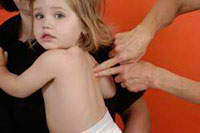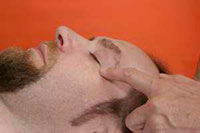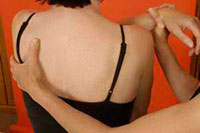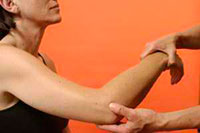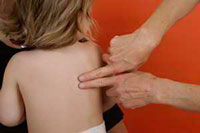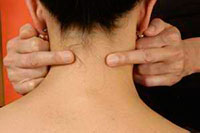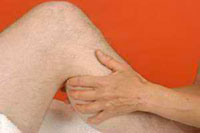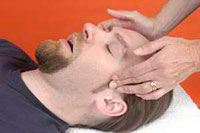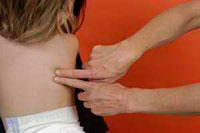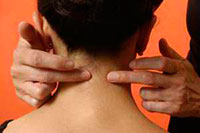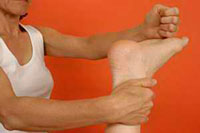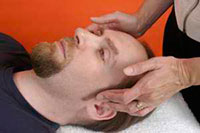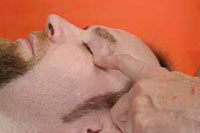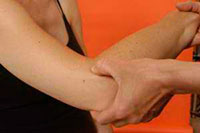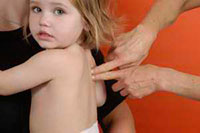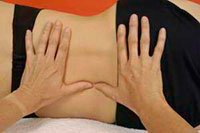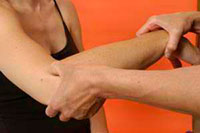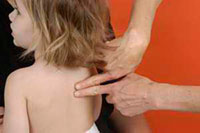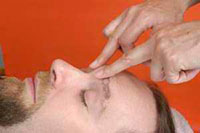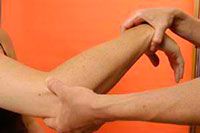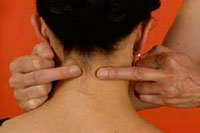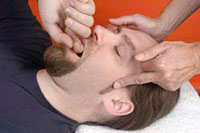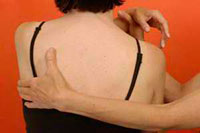BOWEN ARTICLES
Adventurer Bear Grylls' battle with back pain
Article by by Moira Petty, taken from MailOnline.co.uk (April 2007) - original article here.
To the outside world, the adventurer Bear Grylls epitomises supreme fitness. The man who catapults himself into alien, life-threatening environments, surviving on his wits alone, practically bursts with good health - or so it seems to the viewer watching him on television from the comfort of the sofa.
Yet despite appearances, Bear has been plagued with back pain for over ten years - for which he only recently found an effective treatment.
More worryingly, he also suffers from high levels of cholesterol, caused by a genetic disease which killed his father and grandfather - and which poses as much of a danger to him as his Boys' Own exploits.
Adventurer Bear Grylls may throw himself into some of the most uninhabitable places on earth but the super fit action man suffers from a genetic condition which means he suffers from very high colesterol levels.
Bear's father, former Tory MP Sir Michael Grylls, died suddenly of a heart attack at 66 in 2001; his grandfather also died prematurely of heart disease.
But it was only six months ago that Bear had a cholesterol test. He was staggered to find that he had a reading of six-and-ahalf, which is very high for someone of his age and fitness.
"I had been in the SAS Territorial Army and spent my life on physical challenges. Even when at home I exercised six days a week, alternating circuit training, running and yoga," says Bear, now 33.
Without these high levels of activity his reading could have been even worse; his older sister, Lara, had an even higher reading of eight.
Doctors recommend that cholesterol levels are under five and even lower for patients at particular risk of heart disease.
Bear appears to suffer from a hereditary predisposition to dangerously high levels of cholesterol, which clogs the arteries and can lead to heart attacks and stroke. The condition - hypercholesterolaemia - affects seven people in 1,000.
Men with the condition are at greater risk of heart attack: 80 per cent will have had their first heart attack by 60, but many will suffer one in their 40s or 50s.
Although the condition is not caused by a bad diet, it can be improved by one low in fats.
Despite the warning given by his father's and grandfather's heart attacks, Bear had enjoyed a diet rich in animal fats, especially meat and milk which he thought necessary to sustain his high-octane and physically strenuous existence.
But soon after his cholesterol test, he came across The Rave Diet, written by American filmmaker Mike Anderson, who had seen members of his family die of cancer and heart disease.
Based on fruit, vegetables and wholegrains with as much raw food as possible and no animal fats or vegetable oils, it is a Spartan regime, but Bear has embraced it enthusiastically.
"After I read this, the links between the heart disease which killed my father and grandfather, my high cholesterol and my fatty diet became startlingly clear. My mother fed my father butter and cream all day long.
"It breaks my heart that my father never knew my children. He should have been around for another 25 years."
Bear has learnt that the key to his survival may lie not in his awesome ability to live off hostile landscapes, but in adhering to the sort of lifestyle advice promoted in every GP's surgery.
"I am planning to have my cholesterol tested again soon. But I think my new diet is the answer."
Bear, his wife Shara and two sons (aged four and one) now eat neither meat nor fish, but get their protein from nuts, seeds, pulses and quinoa (a proteinrich grain which can be used like rice or as a porridge).
They also drink oatmilk (made from oats mixed with water and other grains and beans; it is high in fibre, vitamin E, folic acid and phytochemicals, which fight cancer and heart disease).
"We're not bonkers about it - if we go out, we eat what's available. And when I'm on an expedition I eat what I have to in order to stay alive. I've eaten sheep's eyes, the still hot meat from a zebra killed by a lion, and maggots which give you 70 calories to the ounce."
As well as his risk of heart disease, Bear also suffers from chronic back problems.
Twelve years ago, aged 21, he broke his back when training with the SAS after his parachute failed to inflate at 16,000 feet.
"I should have cut the main parachute and gone to the reserve but thought there was time to resolve the problem." He landed on his parachute pack, which was like an iron bar, and fractured three vertebrae.
It was extraordinary that he was alive, let alone not paralysed - but incredibly the spinal cord, which channels messages between the brain and all parts of the body, had not been severed.
Bear was treated at Headley Court, the defence forces' rehabilitation centre in Surrey.
"The doctor said I was a miracle man. I had come so close to severing my spinal cord. Because of my age and my fitness, they decided I could avoid surgery."
Instead, he underwent ten hours a day of physiotherapy, swimming, stretching and ultrasound treatment - a programme designed to help servicemen get back to active duty, but rarely available to civilians.
The alternative - and one offered to most people in a similar situation, but without Bear's peak fitness - is surgery to fuse the broken vertebrae.
'I had nightmares for months. Still, I was lucky to walk away without surgery - but ever since, I have suffered twinges and pains."
Deep massage helped, but he says he always felt physically 'unbalanced' by his injury.
Then a year ago his wife suggested he see a Bowen therapist. The Bowen technique, developed in the 1950s, involves using rolling movements over muscles, ligaments and tendons.
This is said to send impulses to the brain to trigger the body's own healing system.
Precisely how it works is a mystery, but many professional football clubs maintain a Bowen therapist as it has been shown to be very effective in realigning the skeletal structure.
"I was sceptical, but wanted to keep an open mind," says Bear.
He went to see East Sussexbased Bowen therapist Sarah Yearsley.
"With the slightest squiggle of her fingers, it felt like petrol was being put back in my tank and I could feel all the stress seeping away. More importantly, after my back accident, my spine and pelvis had lost alignment, so I felt unbalanced."
Sarah explained that Bear's pelvis was slightly twisted - and that this would cause endless problems and backache.
Most fans of Bear's Born Survivor series will not have noticed anything wrong, yet a subtle misalignment - visible only to the expert eye - can impact on total health For Bear, who is often jumping out of planes, having complete structural alignment is even more important than for the average person.
Bear describes himself as now 'hooked' and has treatment every month.
It has helped him prepare for his most perilous challenge yet. Next month he is attempting a powered paraglide over Everest's 29,035ft summit.
"I am scared I could black out in the click of a finger." If this venture seems inconsistent with his desire to lead a healthy life, Bear has an announcement.
"This is the last of my big expeditions or challenges. They're getting too dangerous. I'm not on the Ranulph Fiennes road of trying to beat the last expedition." Sir Ranulph has been an inspiration to Bear all his life.
As a boy, Bear climbed the bell tower at Eton, where the baronet had also once been a pupil. "In the lead lining, I found the initials RF. I put BG next to his," he recalls.
But while he is 'full of dreams and ambitions,' he also has a family and a long-suffering wife at home.
In fact, relaxation is vital to Bear, who says, somewhat surprisingly: "I don't thrive on stress. I love lying on the deck on our houseboat reading a book.
"I'm terrified of walking into a room full of people. Sitting down at a dinner table with 15 strangers brings me out in a sweat." Yet, he says, fear isn't the reason not to do something.
"I'm scared of heights, yet I've just abseiled 770 feet off Canary Wharf for charity.
"But the folly of youth is that you think you're immortal. Losing my father and having my children has brought me to my senses. I want to be around to love and guide my sons for a long time."
